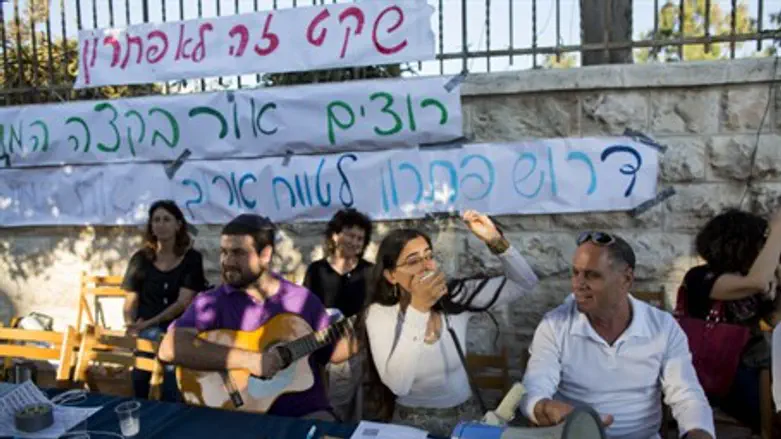
Gaza Belt residents protested outside the Prime Minister's House in Jerusalem on Saturday, after a series of rockets Friday caused several communities to evacuate.
The protesters put some remains of rockets at the entrance to the compound, and asked Prime Minister Binyamin Netanyahu to meet with them personally - as well as work towards security and peace in the long term.
Frustration at the constant barrage of rocket fire on Gaza Belt communities - which has been an ongoing issue for roughly fourteen years- came to a head Friday, after four year-old Daniel Tragerman, hy"d, was killed by a mortar shell in his home community of Nahal Oz.
During the demonstration, the residents had a moment of silence and lit candles in Daniel's memory.
"We do not blame the missile launchers, but the Israeli government's inability to change the situation," participants said.
More than 3,500 rockets have been fired from Gaza on Israeli civilians since Operation Protective Edge broke out 48 days ago.
However, at least 8,500 rockets have been fired on southern communities since Israel's Disengagement from Gaza in 2005, according to estimates last month - and many southern residents are frustrated that the government, in their eyes, accepts rocket fire in their region as "status quo."
Frustration escalated after the IDF had told the Gaza Belt communities in recent months that it will cut funding for community security coordinators, after an inexplicable decision to remove IDF guards from the communities. A short time later, the war broke out - and Gaza Belt residents were hit hardest.
Avi Davoosh, a resident of Kibbutz Bror in Sha'ar HaNegev, spoke to Walla! News late Saturday night about the protests.
"We were sitting in a tent near the Prime Minister's house all weekend," Davoosh said. "This evening we filed the application for Netanyahu to meet with us."
"We want Netanyahu to talk to us face to face," he added. "We are looking at the long term [solution], at the many years ahead of us. We are not talking about how to end the current round and then, in another year or two, to go back to the same situation again."
"We feel that the government of Israel in the last 14 years has not gone in that direction," he continued. "So far, this has been policy without purpose. We are not in favor of a temporary and fragile peace, and if it is necessary to go 'all out' to achieve a long-term solution, we are willing to pay the price."
Anat Heifetz, a resident of Kibbutz Nirim in the Eshkol Region, agreed.
"We call on the Prime Minister to show us how he plans to solve the security problem we have suffered from for 14 years," she said. "We hope that, contrary to what we see now, he does have a strategy and a vision."
"We must not accept this method that all Israeli governments have adopted: conflict management in a way that gives us confidence, not operations in Gaza that recur every two-three years," she added.
